Ed Brisson's THE VIOLENT is seeing a TPB release on Wednesday, September 14th. Zeb Larson discusses the series with Ed, some of the political and social significance of the book, Ed's work on CLUSTER, and some of Ed's upcoming work.
ZEB LARSON: What first got you interested in writing The Violent?
ED BRISSON: THE VIOLENT is something that’s been percolating for a long time. It’s a continuation of what I’d been doing in MURDER BOOK and something I’ve wanted to do since penning the first MURDER BOOK story.
I’m a huge crime fiction fan and simply wanted to write the type of crime that I wanted to read. Not stories that are simply about heists or the long con, but of people struggling with who they are and the things that they do. I like reluctant criminals. People struggling with their morality.
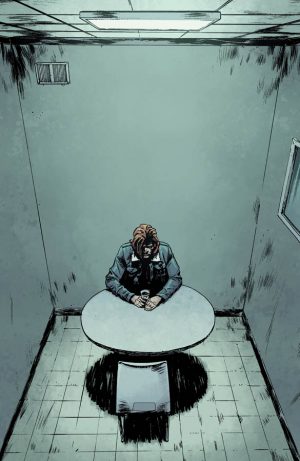 ZL: Obviously, you live in Vancouver. But is there another reason you picked the city for the setting of this book, beyond your familiarity with it?
ZL: Obviously, you live in Vancouver. But is there another reason you picked the city for the setting of this book, beyond your familiarity with it?
EB: Used to. I moved out of Vancouver ten days ago. I’m now living in Kelowna, which is about 400km (250mi) north-east of Vancouver.
I picked Vancouver for several reasons. Firstly, because I live(d) there and always thought that it’d make a great setting.
Being Canadian, you NEVER see stories set where you live. Even when a Canadian writes something that you KNOW is meant to be set in Vancouver, they’ll use Seattle as a proxy instead (or New York for Toronto, etc., ). I was guilty of doing this with COMEBACK.
There’s an idea that American’s won’t read anything that’s not set in the United States -- unless it’s some sort of globetrotting, James Bond-style adventure. Same goes for film. And, I guess, I stubbornly thought: “Fuck that.” I’m going to write stories where I want to see them and hope others will read along.
THE VIOLENT and MURDER BOOK are first-and-foremost, the books that I want to write and what I wanted to see on the racks. I want stories set in Vancouver and no longer give a flying fuck if someone doesn’t want to read something set outside their own country. It’s part of a need to establish ourselves as a viable setting for fiction.Vancouver is an incredibly unique city and the crime we’re going to see there reflects that. This isn’t going to be a New York story transplanted to Vancouver. THE VIOLENT and MURDER BOOK are both very specifically Vancouver stories.
Vancouver is an incredibly unique city and the crime we’re going to see there reflects that. This isn’t going to be a New York story transplanted to Vancouver. THE VIOLENT and MURDER BOOK are both very specifically Vancouver stories.
ZL: The Violent reads like a personal project, especially with the focus on your home city. How has Vancouver shaped your work?
EB: Adding to what I’d mentioned above, Vancouver is where I met a lot of my contemporaries. Before moving there in the late 90s, it was just me and one or two friends in Kelowna trying to do comics without any real connection to a larger creative base. We would connect with some people through the mail and zine/mini-comic trading, but there was no in-person connection.
When I moved to Vancouver, I eventually found myself falling in with a large group of comic creators, and I think that a lot of us fed off one another. For me, and most creatives I’m sure, I’m pushed to do better when I see people around me creating amazing work. I don’t want to be left behind, I guess. I really started pushing myself when I was in Vancouver, which is something that probably wouldn’t have happened if I’d stayed in Kelowna.
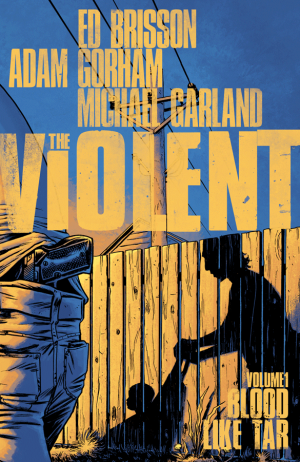 That said; obviously, the internet serves that same purpose for a lot of people. Had I started even just a few years later, then I would have probably found that same support on-line -- and, honestly, have since found it. Every day I talk to other writers and comic creators on-line. Writers who live in Calgary, Toronto, Portland, New York, etc.
That said; obviously, the internet serves that same purpose for a lot of people. Had I started even just a few years later, then I would have probably found that same support on-line -- and, honestly, have since found it. Every day I talk to other writers and comic creators on-line. Writers who live in Calgary, Toronto, Portland, New York, etc.
Aside from the comic community, Vancouver gave me a lot of angst and frustration. The housing crisis is just one thing that fuels me. I’m a father and my wife, and I want to provide a stable home for our kid, which feels impossible to do in Vancouver, where renovictions seem to be the norm. (A “renoviction” is a Vancouver term for getting booted from your home so it can be renovated into a multi-unit home or torn down to make way for condos. Just one of hundreds of stories you can find on it: Link). In six years, we lost two homes to renovictions. At my daughter’s school, I’ve talked to other parents who’ve faced the same, some on their third or fourth renoviction.That’s the selfish part that keeps me going. The anger for something that hits me directly.
That’s the selfish part that keeps me going. The anger for something that hits me directly.
But, Vancouver is also home to one of the poorest and most drug addled areas in all of Canada. The Downtown Eastside is a stark reminder of how we’re failing those most in need of help. It’s a place where a serial killer worked for YEARS undetected. When most people think of Canada, they don’t picture that. It feels disingenuous to not talk about and to not feature it in a book about Vancouver.
ZL: The first issue of this book focused on the real estate investments by foreign investors in Vancouver and how expensive the city has become. Is this story at least partly about the pressures of capitalism in the 21st century?
EB: In a roundabout way, I guess it is. But, primarily it’s meant to be a snapshot of what life is like while trying to survive in present-day Vancouver. What it’s like when investment and money are placed ahead of the needs of citizens.
ZL: Vancouver is one of many cities that are becoming so expensive that the original inhabitants can no longer live there anymore. Is there any hope for these places?
EB: I don’t know. Right now, in Vancouver, the cost of owning a house would require something close to 140% of the average household income. Theoretically, your mortgage should be about 30% of your household income. It’s pretty dire.
The BC government has just removed the ability for the BC’s real estate industry to self-regulate. It’s something that’s overdue, and I’m not sure what good it will do now that most of the damage has been done. I’m not convinced it’s not all for show, but we’ll see.
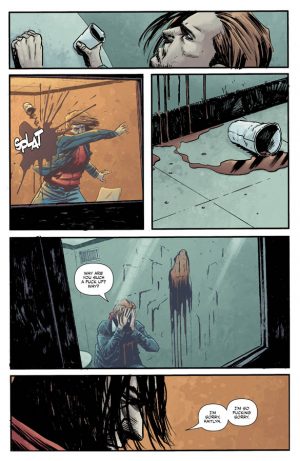 The government is also introducing new taxes and regulations regarding empty houses owned by foreign investors. That’s something that I think a lot of people outside of Vancouver don’t understand -- there are apparently hundreds (thousands?) of houses that have been bought by foreign investors that are sitting empty. They’re being treated like stocks. They’ll sit for a year or so and then get flipped again with earnings upwards of 35%.
The government is also introducing new taxes and regulations regarding empty houses owned by foreign investors. That’s something that I think a lot of people outside of Vancouver don’t understand -- there are apparently hundreds (thousands?) of houses that have been bought by foreign investors that are sitting empty. They’re being treated like stocks. They’ll sit for a year or so and then get flipped again with earnings upwards of 35%.
Because you have that much stock taken out of the market, demand on other houses goes up, as do prices. Because the house (and now condo) prices are out of reach for most, you’re pushing people who wouldn’t be in the rental market into it. That then increases the demand for rentals which, of course, increases the cost of rentals.
ZL: There seems to be a central tension in this book between environment and personal responsibility. Was that intentional?
EB: Absolutely. Bad shit doesn’t happen in a vacuum. There’s a reason that neighbourhoods plagued with poverty are also besieged by crime.
After my parents split, we had a lot of money issues in our home. I’ve lived through that stress. I’ve seen how barely scraping by and getting deeper and deeper into debt can really push a person to the brink. I’ve experienced it.
I knew others growing up who had it even worse. And I saw what it did to them and their families.
ZL: What are the long-term plans for the series? (ZEB: Edited this slightly. Turns out the series WILL be continuing with Image, but we’re not ready to announce that just yet. It’ll be coming out in trades and not single issues).
EB: There are a few conversations happening at the moment, but nothing is solid.
What fairly sure about is that we’re going to Kickstart it, probably in October. We’d look to release as single issues (digital only) and trade (print). The Kickstarter will cover the trade costs, which we’re working to figure out right now. We want to make the campaign as inexpensive as possible while ensuring that Adam, Michael, and Tom get paid.
Ideally, we’ll do a minimum of three more arcs this way, with a goal to Kickstart and release one volume per year.
ZL: What else do you want to explore in The Violent? Will it stay in Vancouver?
EB: The second volume is set to take place in Kelowna in the late 80s. We’d been planning for this second arc and the setting before my family, and I decided to move to Kelowna. Some sort of simpatico, I guess.
THE VIOLENT will always be about family, how families impact our lives and the lasting effect of our actions. The second arc will look back at the life of Jesse McPherson and show us things from his childhood that ultimately lead to him becoming a police officer. It’s set in 1986, which is the year that Vancouver hosted Expo 86, which many believe laid a lot of the groundwork for what would eventually lead to the Vancouver housing crisis.
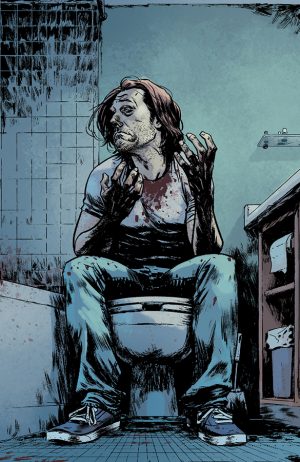 ZL: I want to switch gears to talk to you about Cluster, which I finally got to sit down with a few months ago. Where did the inspiration for that story come from?
ZL: I want to switch gears to talk to you about Cluster, which I finally got to sit down with a few months ago. Where did the inspiration for that story come from?
EB: That’s an odd one. The original germ of CLUSTER is something that I’ve been batting around with since I was in high school. Originally, it was going to be a story about a group of bad-ass prisoners who escape prison while on an alien planet. Sort of straight action. But, over the years, it changed up quite a bit until it became what you saw.
A lot of the inspiration for it came from 80s schlock and b-cinema. I’m a huge film fan and growing up; I would plunk myself in front of the TV with a stack of VHS rentals and watch 4 or 5 movies a night (long time insomnia sufferer). I wanted CLUSTER to have that same feel… like an 80s b-movie, but… you know… good.
Damian is the one who really killed it on that front. His designs and world building in CLUSTER were incredible. He’s an insanely versatile artist. I really love working with him.
ZL: One of the ways that I read that story was as a retelling of Euroamericans and settler imperialism: people coming in and taking land from somebody else, while creating a narrative that the land never really belonged to anybody, to begin with. Was that intentional? If so, what led you down that path?
EB: You’re 100% right in your assessment. It just seems to me that if we were to inhabit other planets, humans would repeat past behavior, no matter how often we may claim that we’ve evolved past it.
ZL: Cluster is another story that takes a look at an ugly side of capitalism: private prisons and private military contractors. What was the idea behind that?
EB: I live in Canada where we have much less privatization than the US. There’s often a push here to privatize health care and prisons, which most understand is a dangerous thing, but greed will always keep pushing. The former head of the Doctors of BC runs a private surgery centre and sued the BC government last year, claiming that residents of BC have the constitutional right to pay for care in private clinics, if they want to circumvent the public system. The public system may not be perfect, but at least it allows everyone access to health care. Those arguing for privatization claim that it’ll ease the pressure on the public system. However, the answer is in better public funding and NOT corporatization. That’s how, in the US, you pay $20 a tablet for Advil when you’re in the hospital.
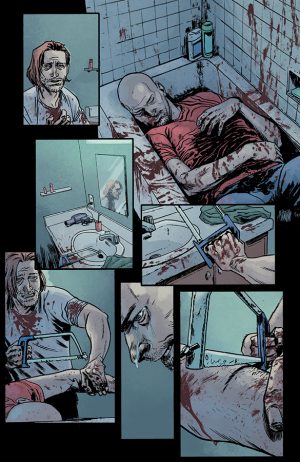 It’s the same with prisons. When you make it so that investors and shareholders profit from people being IN prison, then you’ve created a system where there’s no incentive to rehabilitate. Your whole model depends on you keeping cells full and profits rolling in. This leads to dialing back on programs for prisoners and even jobs for those tasked with watching prisoners. (Here’s an interesting, though very long, article from the inside of a private prison that I highly recommend: Link).
It’s the same with prisons. When you make it so that investors and shareholders profit from people being IN prison, then you’ve created a system where there’s no incentive to rehabilitate. Your whole model depends on you keeping cells full and profits rolling in. This leads to dialing back on programs for prisoners and even jobs for those tasked with watching prisoners. (Here’s an interesting, though very long, article from the inside of a private prison that I highly recommend: Link).
Anyhow, with CLUSTER, I wanted to focus on a prison system and military that were not only profit driven, but also feeding off of one another. The idea was that with the military feeding from the prisons, the prisons would need a steady supply of warm bodies, which in turn was influencing the court process and the convictions that we’re being handed down for petty crimes. The central idea was largely influenced by the “Kids for Cash” scandal that broke a few years back, where it seemed that a couple of judges in Pennsylvania were getting kickbacks from a private prison for sentencing to harsh, out of step with their crimes, terms in said private prisons.
To be honest, I didn’t really get to delve as deeply into this in CLUSTER as I’d wanted to. I’d planned for the corruption to be revealed and there to be fallout from said corruption. But, we ran out of time.
ZL: The world-building that went into that story was extensive. Will it be continued at any point? If so, what would you like to do with it?
EB: Yeah, I would love to come back and do more CLUSTER.
I think we left it at a good point where we could go back and do more without it feeling like a cash-in. Also helps that I’d had ideas to continue it before we ended it, so already knew where it’d go next.
As to where it’d go and what it would cover, I think I’ll leave that a mystery for now.
ZL: What project comes next?
EB: I’ve got a book brewing at Stela with Damian. It’s a straight crime story called THE BIG IDEA. It’s about a couple roommates who get caught up in a war between two ex-business partner chiropractors. It may sound a little pedestrian, but it’s a lot of fun.
Other than that, I’ve got two projects, one of which is a creator-owned book, that are in the works. I’m also writing BULLSEYE for Marvel, which drops in January of 2017. Pretty excited about that. I really love the idea of telling a story from the villain’s perspective and think that people are really going to dig the direction we’re taking it.
Non-comic related, I’m co-writing two feature film scripts. One is with a director who I’ve worked with in the past and the other with a producer who I’ve known for a long time. Can’t say too much about these either, but can say that both are based on MURDER BOOK stories.







